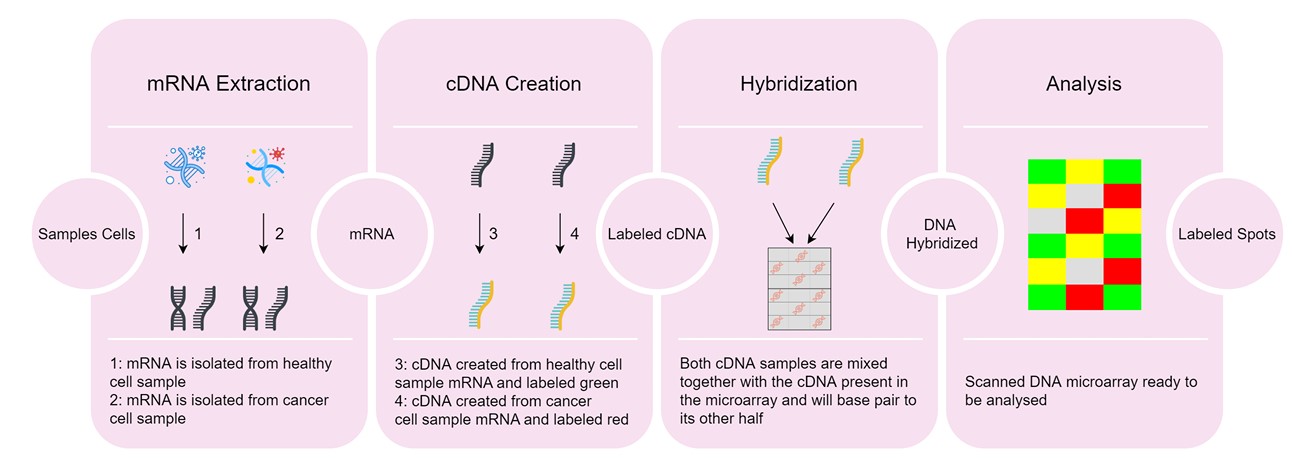Exosomal mRNA Microarray Service
Overview Services Features FAQs
Creative Biolabs spares an effort to provide high-quality exosomal mRNA microarray services for rapid and comprehensive exosome mRNA profiling.
Exosomal mRNA Microarray
Over these decades, multiple types of gene microarrays have been developed and extensively applied for the gene analysis of human diseases, being useful tools for genomics and genetics research. Exosomal mRNA microarray is a high throughput and reliable method to profile mRNAs in exosomes. Generally, before performing the microarray, it should first isolate exosomes and their mRNAs from the target body fluids. The cDNA library is then created by utilizing RT-qPCR to convert the isolated mRNAs into cDNA. Add the cDNA library to a DNA microarray chip, the exosomal cDNA complementary sequence will be hybridized with the pre-labeled probe on the chip. The exosomal mRNA profiles can be visualized and analyzed by detecting the fluorescence intensity of microarray probes.
 Fig. 1 Overview of the DNA microarray technique data acquisition from samples.1
Fig. 1 Overview of the DNA microarray technique data acquisition from samples.1
One-Stop Exosomal mRNA Microarray at Creative Biolabs
Our Exosomal mRNA Microarray service offers a comprehensive platform for the analysis of mRNA molecules within extracellular vesicles called exosomes. This service is essential for researchers investigating the role of exosomal mRNA in various biological processes, including but not limited to, disease progression, drug response, and immune modulation. Our state-of-the-art technology allows for the simultaneous measurement of thousands of mRNA transcripts, providing a comprehensive view of the exosomal transcriptome.
In addition to exosomal mRNA microarray tests, an array of support products and services are also available, which mainly include but are not limited to:
 Fig.2 Exosomal mRNA microarray.2
Fig.2 Exosomal mRNA microarray.2
Features
-
High Throughput: Analyze thousands of mRNAs in a single experiment, offering a broad coverage of the exosomal transcriptome.
-
High Sensitivity: Detect low abundant mRNA species with high sensitivity and specificity.
-
Customizable Panels: We offer customizable microarray panels to fit your specific research needs, including disease-specific panels and custom-designed probes.
-
Advanced Quality Control: Rigorous protocols ensure high-quality data with minimal background noise and cross-hybridization.
-
Easy Data Interpretation: User-friendly data analysis tools and detailed reports make it easy to interpret your results.
As a professional research organization, Creative Biolabs is committed to providing high-level and comprehensive exosome services to advance exosome-based therapy development. Please do not hesitate to contact us for technical support and tailored solutions if there is no option for the exosome service you're interested in.
FAQs
Q: What is the minimum amount of exosome samples required for the Exosomal mRNA Microarray?
A: The minimum amount of exosome sample required for the Exosomal mRNA Microarray is typically 25μg of isolated exosomes. The precise amount, however, can differ based on the caliber and volume of RNA that was taken out of your exosomes. Our group can offer advice depending on certain situations.
Q: How long does the Exosomal mRNA Microarray service take?
A: The Exosomal mRNA Microarray service typically takes 8-12 weeks from sample reception to the delivery of final data reports. However, this timeframe can be adjusted upon request to accommodate urgent projects.
Q: Can you provide custom microarray panels?
A: Yes, we offer customizable microarray panels. Our team can work with you to design panels tailored to your specific research needs, whether you require disease-specific panels or custom-designed probes targeting particular mRNA transcripts of interest.
Q: How sensitive is the Exosomal mRNA Microarray for detecting low abundant mRNA species?
A: We provide user-friendly data analysis tools along with detailed reports to facilitate easy interpretation of your results. Our bioinformatics team is also available to assist with more complex data analysis needs upon request.
References
-
Nogueira, Adara, Artur Ferreira, and Mário Figueiredo. "A machine learning pipeline for cancer detection on microarray data: the role of feature discretization and feature selection." BioMedInformatics 3.3 (2023): 585-604. Under Open Access license CC BY 4.0, without modification.
-
From Wikipedia: By Squidonius, Public domain, https://en.m.wikipedia.org/wiki/Microarray_analysis_techniques#/media/File%3AMicroarray_exp_horizontal.svg.
For Research Use Only. Cannot be used by patients.
Related Services:

 Fig. 1 Overview of the DNA microarray technique data acquisition from samples.1
Fig. 1 Overview of the DNA microarray technique data acquisition from samples.1
 Fig.2 Exosomal mRNA microarray.2
Fig.2 Exosomal mRNA microarray.2









